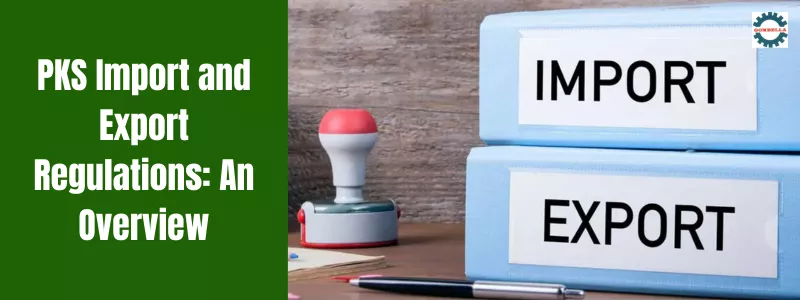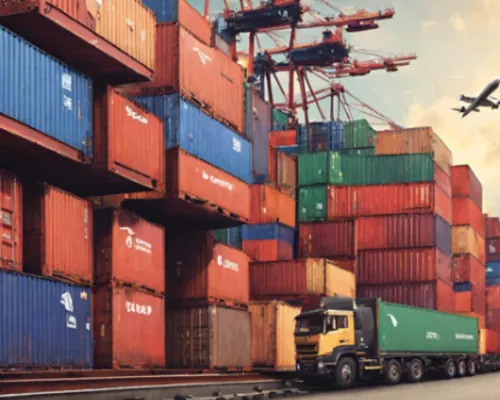-
-
Suite 1, Floor 2, Wing C, Alhaji Adenekan Plaza, Okota Road, Isolo, Lagos State, Nigeria
Blog Details

14
NovPKS Import and Export Regulations: An Overview
PKS Import and Export Regulations: An Overview
Contents
In today’s interconnected global economy, import and export regulations play a crucial role in ensuring fair trade practices, protecting national interests, and safeguarding the environment. For both importers and exporters, understanding and complying with these regulations is of paramount importance. In this blog post, we will provide you with an overview of PKS import and export regulations, discuss recent changes and their impact, explore common challenges faced by businesses, offer tips for compliance, and shed light on future trends in PKS regulations.
Introduction
The world of import and export is a dynamic landscape, governed by a complex web of regulations. These regulations are in place to protect the interests of nations, businesses, and consumers alike. Staying informed and compliant with PKS import and export regulations is not only a legal obligation but also a strategic advantage in the global marketplace.
Current Regulations
PKS import and export regulations encompass a wide range of requirements and standards. These regulations cover various aspects, such as product safety and labeling, documentation, customs procedures, and more. They are designed to facilitate the seamless flow of goods while prioritizing public health, safety, and environmental protection. It is crucial to familiarize yourself with the specific regulations that pertain to your industry and the countries you engage in business with, ensuring full compliance to avoid any potential issues or penalties. By understanding and adhering to these regulations, you can effectively navigate the complex landscape of international trade and maintain successful business operations.
If you want to obtain or learn more about PKS export and import regulations, there are several go-to resources. First, you can consult official government websites that often have dedicated sections for import and export regulations.
These websites provide up-to-date, authoritative information and guides on compliance practices. Secondly, industry associations and trade groups can be excellent resources for regulatory information and advice. They often provide training, workshops, and seminars on regulatory changes and compliance strategies. Another valuable resource is legal consultancies and customs brokers who specialize in import and export regulations.
They can provide tailored advice, help you navigate complex documentation requirements, and keep you informed about the latest regulatory changes. Finally, subscribing to trade journals and periodicals can also help keep you abreast of new regulations and trends in the industry. Remember, staying informed and proactive is key to successfully navigating the ever-changing landscape of import and export regulations.
Recent Changes and Impact
The landscape of import and export regulations is constantly evolving. Keeping up with recent changes is crucial for businesses to adapt their practices and remain compliant. Changes in PKS regulations can stem from shifts in international trade agreements, advancements in technology, or emerging environmental and social concerns. Understanding these changes and their impact on your business is essential for staying ahead of the curve.

Changes in PKS Import and Export Regulations since 2021
Several significant changes to the PKS import and export regulations have happened since 2021. For starters, PKS regulations have seen amendments in response to changes in international trade agreements, with the goal of promoting fair trade and competitiveness in the global marketplace.
An important adjustment has been the introduction of stricter environmental regulations. This change reflects the growing global emphasis on sustainability, with increased scrutiny of the environmental footprint of imported and exported goods. For instance, there have been new requirements related to the packaging and disposal of PKS products, aiming to reduce waste and promote circular economy principles.
Additionally, there have been significant technological advancements influencing PKS regulations. The adoption of digital documentation and e-certification has been hastened, making the process more transparent, efficient, and accessible. This digital transformation is intended to streamline trade procedures and combat fraudulent practices.
Lastly, in response to emerging social concerns, there has been a push towards ensuring the fair and ethical treatment of labor in the PKS industry. This has resulted in stricter labor standards and requirements being integrated into the PKS regulations, reflecting a commitment to social responsibility in global trade practices.
These changes underscore the dynamic nature of import and export regulations, highlighting the need for businesses to continually monitor and adapt to regulatory shifts.
Challenges Faced by Importers and Exporters
Compliance with PKS import and export regulations can indeed be a daunting task. Businesses often face numerous challenges when it comes to navigating complex documentation requirements, understanding and meeting product standards, managing logistics, and ensuring supply chain transparency. These challenges require a proactive approach, attention to detail, and a commitment to continuous improvement.
One of the common documentation challenges businesses encounter is the need to accurately complete and submit various forms and reports to comply with PKS regulations. This includes providing detailed information about the imported or exported products, their origins, and the parties involved in the transaction. Moreover, businesses must also ensure that the products meet the specific standards set by the regulatory bodies, which may require additional testing or certifications.
Managing logistics is another critical aspect of PKS compliance. Businesses need to coordinate the transportation and handling of goods, ensuring that they are properly packaged, labeled, and stored during transit. This often involves working closely with logistics providers to ensure that the products reach their destinations on time and in compliance with the regulations.
Furthermore, ensuring supply chain transparency is becoming increasingly important in PKS compliance. Businesses are expected to have clear visibility into their supply chains, including knowing the origin of raw materials, the processes involved in manufacturing, and the parties involved in the distribution. This transparency helps in preventing illegal or unethical practices and ensures that the products meet the required standards and regulations.
Overcoming these challenges requires not only a thorough understanding of the PKS regulations but also a proactive and continuous improvement mindset. Businesses should constantly assess their compliance processes, identify areas for enhancement, and implement necessary changes to streamline their operations and ensure compliance with the regulations.
By addressing these challenges head-on and adopting a proactive approach, businesses can navigate the complexities of PKS import and export regulations more effectively and maintain compliance in the long run.
Tips for Compliance
To effectively navigate PKS import and export regulations, consider the following tips:
- Stay updated: Regularly monitor changes in regulations and industry standards to ensure compliance.
- Seek expert advice: Consult with legal professionals or customs brokers who specialize in import and export regulations.
- Maintain accurate documentation: Keep meticulous records of transactions, product certifications, and compliance-related information.
- Invest in training: Equip your team with the knowledge and skills necessary to navigate the complexities of import and export regulations.
- Foster a compliance culture: Develop internal processes and procedures that prioritize regulatory compliance at every stage of your operations.
Future Trends in PKS Regulations
As the global landscape continues to evolve, so do import and export regulations. Anticipating future trends can help businesses proactively adapt their practices. We may see an increased focus on sustainability, enhanced digitalization of customs processes, and greater harmonization of international trade standards. Staying informed about these trends will position your business for success in the ever-changing import and export landscape.
Conclusion
Understanding and complying with PKS import and export regulations is essential for businesses operating in the global marketplace. By adhering to these regulations, businesses can ensure the safety and quality of their products, protect their reputation, and maintain a competitive edge. Stay informed, seek professional advice when needed, and embrace compliance as a strategic advantage. By doing so, you will navigate the complexities of import and export regulations with confidence and thrive in the global marketplace.
Author's Details
gombella
Other posts by gombella